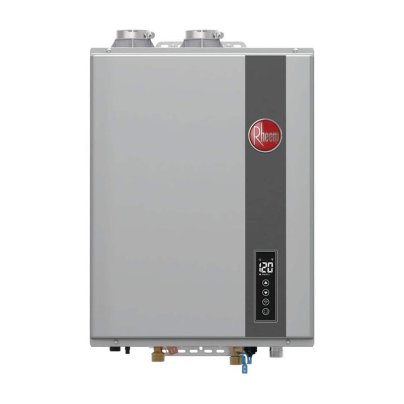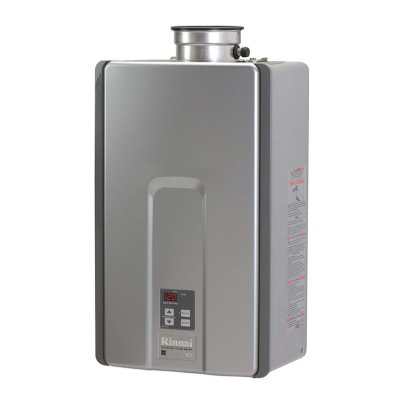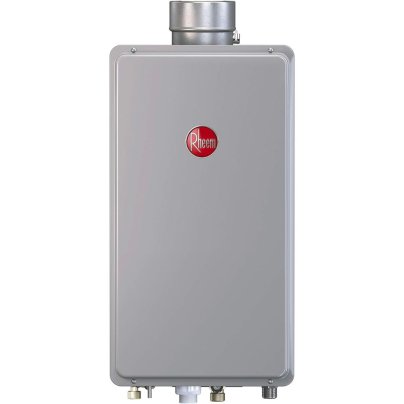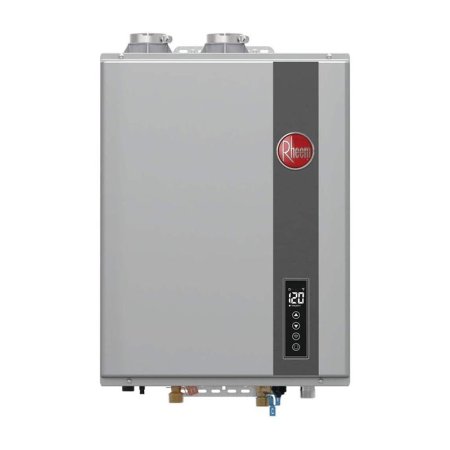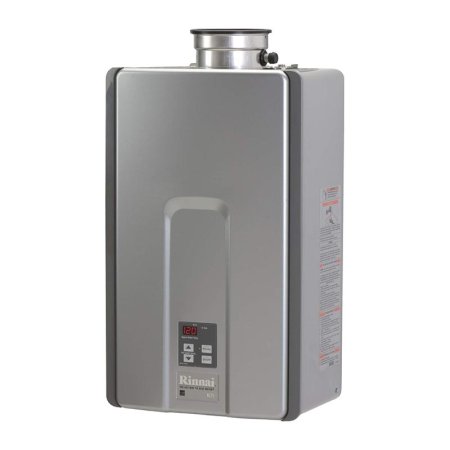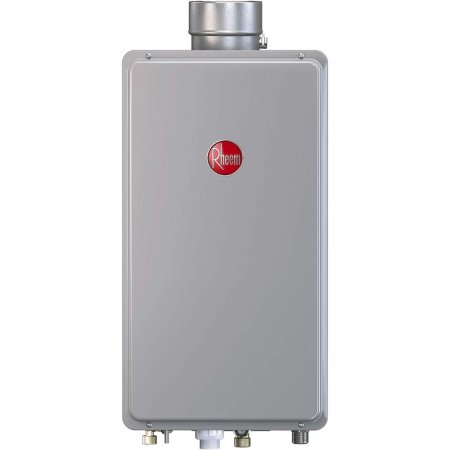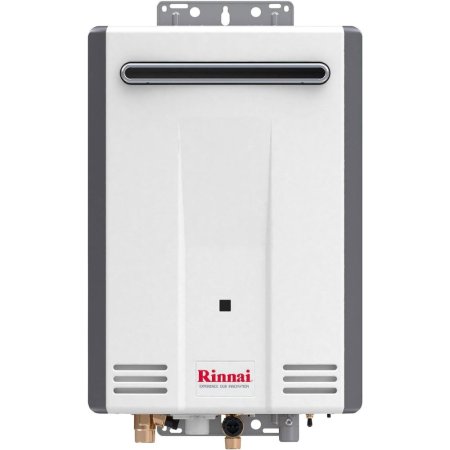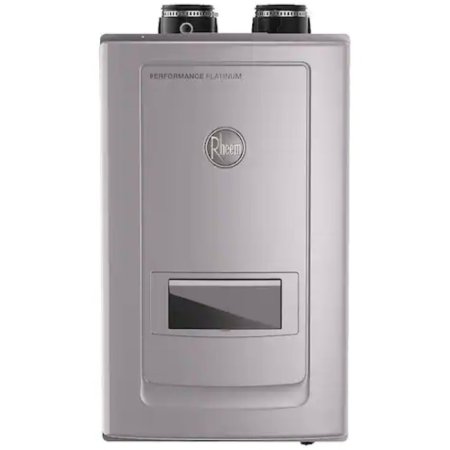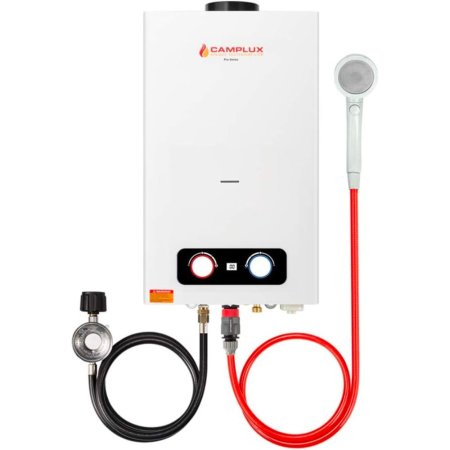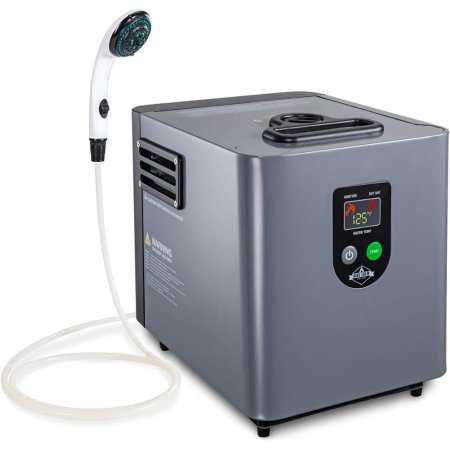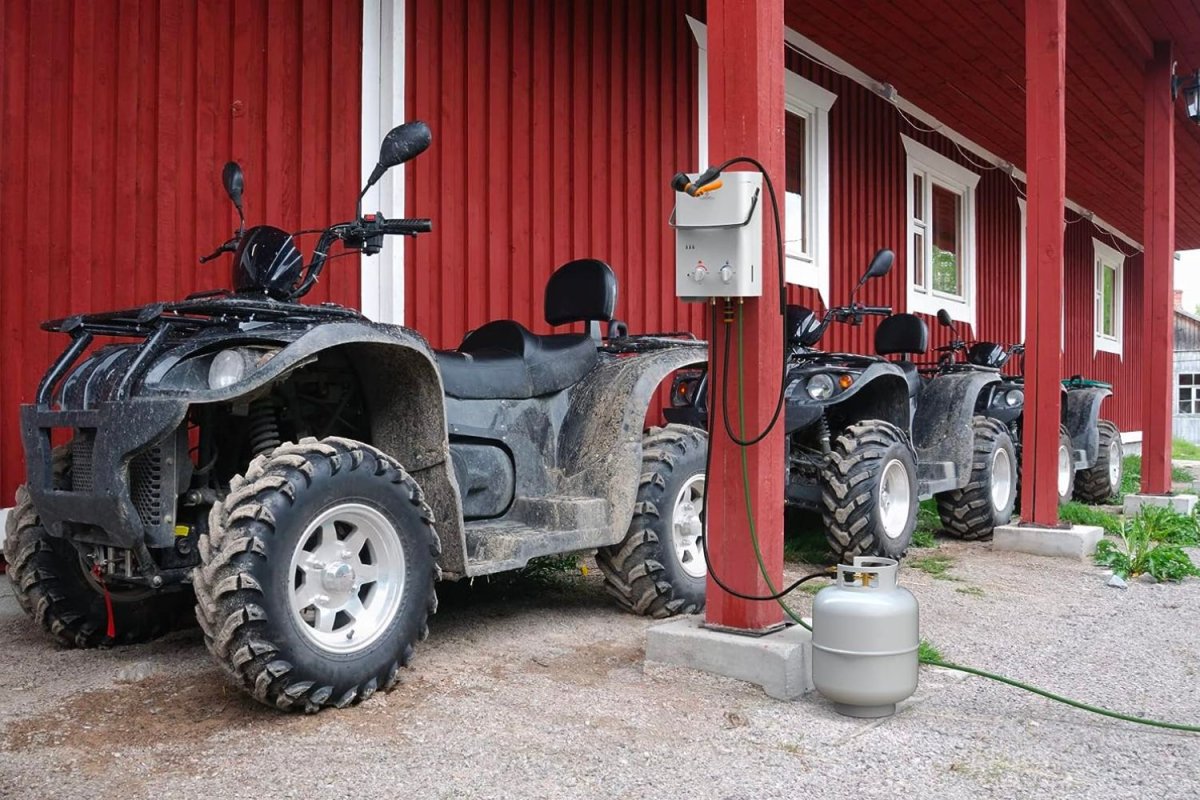
We may earn revenue from the products available on this page and participate in affiliate programs. Learn More ›
Hot water is a basic requirement, but the wide variety of tank-based and tankless systems now available—such as propane tankless water heaters—can make choosing the right water heater a real challenge. Though traditional water heater tanks remain popular, modern tankless models could offer a number of advantages. Installation costs are modest, and the machines are highly energy efficient, so you’ll save money upfront and in the long run. What’s more, a tankless model can often be installed in places where a tank isn’t practical. There are even models designed for RVing and camping.
A tankless water heater supplies hot water “on demand,” meaning that it heats the water you need when you need it. This way, there’s no danger of the tank running out, and energy doesn’t need to be wasted to keep water consistently warm all day and night. Gas water heaters are particularly efficient. For those living in areas where natural gas isn’t available, propane offers a flexible and affordable alternative.
We liked a handful of options, but our top recommendation is the Rheem ECOH200DVELP-3 Performance Platinum Water Heater, which is an efficient, reliable indoor unit that’s compact and easy to use. But other models on our list stood out for other reasons. Use this guide to learn what to look for when shopping for the best propane tankless hot water heater, and find out why the models discussed here are considered among the best propane tankless water heaters on the market.
- BEST OVERALL: Rheem ECOH200DVELP-3 Performance Platinum Water Heater
↓ Jump to Review - RUNNER-UP: Rinnai RL75iP Propane Tankless Water Heater
↓ Jump to Review - BEST BANG FOR THE BUCK: Rheem ECO160DVLP3-1 Propane Tankless Water Heater
↓ Jump to Review - BEST FOR SMALL HOME: Rinnai V53DeP Propane Tankless Water Heater
↓ Jump to Review - BEST FOR LARGE HOME: Rheem ECOH200DVRHLP Performance Platinum Water Heater
↓ Jump to Review - BEST FOR RV: Camplux 2.64 GPM Propane Portable Water Heater
↓ Jump to Review - BEST PORTABLE: Hike Crew Portable Propane Water Heater Pump
↓ Jump to Review
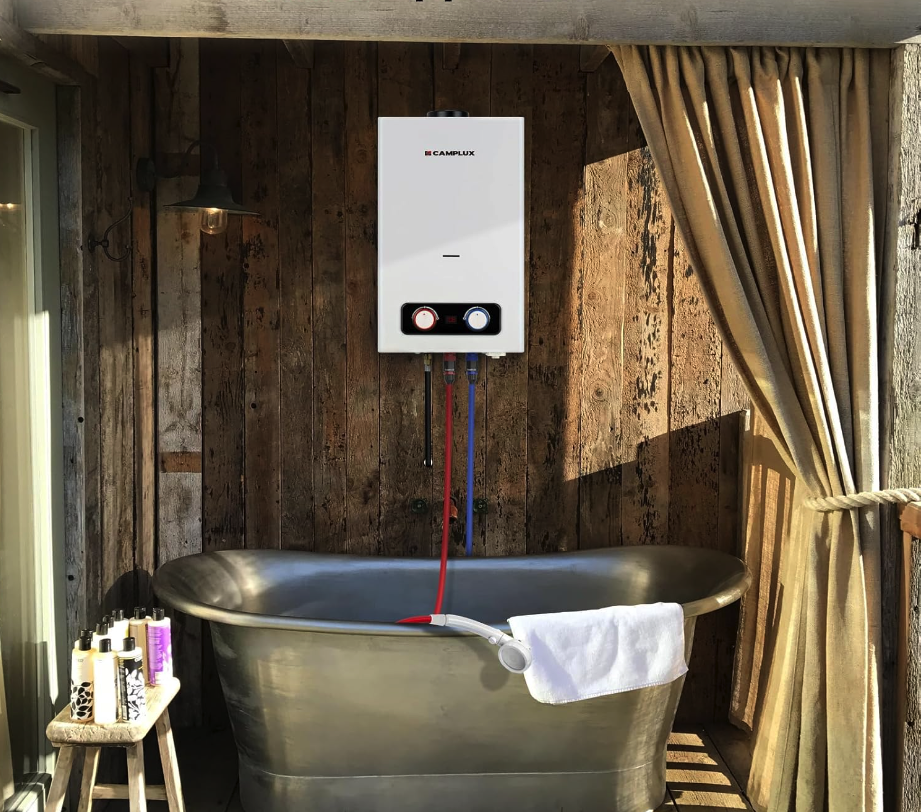
Our Top Picks
The right propane tankless water heater for you will depend on how much water output you’d like and your portability preference for the unit. Below are some of the best indoor and outdoor propane tankless water heaters available, organized by category. Read on for some of these top picks’ best features and specs.
Best Overall
Rheem ECOH200DVELP-3 Performance Platinum Water Heater
Product Specs
- Type: Indoor
- Flow rate: 9.5 GPM
- Power output: 199,900 BTUs
What We Like
- Compact wall-mount design
- Ideal for households of 3 to 5 people
- Reduces cold water bursts and overall water consumption
What We Don’t Like
- Feature-packed and compact, but price reflects that
For efficiency, reliability, versatility, and a host of other standout features, this Rheem tankless water heater is a solid choice. Designed for indoor use, it’s a compact unit rated at 9.5 gallons per minute (GPM) and a maximum of 199,900 British thermal units (BTUs). It is sufficient to run four showers (or equivalent) simultaneously. It is Energy Star certified with a market-leading Uniform Energy Factor (UEF), the Department of Energy’s (DOE) new industry standard for measuring energy efficiency in water heaters, of up to 0.93. This water-saving feature can reduce consumption by up to 1,100 gallons per year.
We like that its precise digital controls make setting the preferred temperature simple. Built-in sensors alert you when maintenance is required. Compatibility with PVC venting pipe reduces installation costs, and a venting distance of up to 150 feet allows great freedom in terms of where it can be fitted.
Get the Rheem ECHO200DVLP-2 propane tankless water heater at Amazon or The Home Depot.
Runner-Up
Rinnai RL75iP Propane Tankless Water Heater
Product Specs
- Type: Indoor
- Flow rate: 7.5 GPM
- Power output: 180,000 BTU
What We Like
- Easy-to-use control panel allows for precise temperature settings
- Compact size takes up less space
- Recirculation technology reduces hot-water delay
- Wi-Fi–enabled; provides extensive diagnostic error codes
What We Don’t Like
- Quite a pricey unit
With its flow rate of 7.5 GPM, it might be easy to underestimate this Rinnai indoor propane tankless water heater. Yet it offers a money-saving alternative to high output systems and, with up to 180,000 BTU, it can run two or three showers consecutively, even in regions with cooler groundwater temperatures. The unit’s UEF is 0.81.
This unit’s recirculation technology reduces hot-water delay, while its digital control with Wi-Fi compatibility allows for precise temperature settings. While faults are rare, this model will provide extensive diagnostic error codes should that happen.
The unit can be fitted with standard or concentric venting; horizontal venting is available at an extra cost. Both isolation and pressure-relief valves are included, which help make annual maintenance flushing much easier.
Get the Rinnai RL75iP propane tankless water heater at Amazon.
Best Bang for the Buck
Rheem ECO160DVLP3-1 Propane Tankless Water Heater
Product Specs
- Type: Indoor
- Flow rate: 7 GPM
- Power output: 160,000 BTUs
What We Like
- Supplies up to 2 bathrooms; suitable for small- to medium-size homes
- Remote control and digital thermostat included; provides accurate temperature control
- Hot start feature to limit temperature fluctuations
What We Don’t Like
- Requires costly steel venting, though otherwise very affordable
Those looking for a competitively priced indoor propane tankless water heater might consider this Rheem. With a maximum output of 7.0 GPM and 160,000 BTU and a UEF of 0.82, this model can meet the needs of a 1- or 2-bathroom home.
Despite the comparatively low cost, some impressive features are included. A digital thermostat offers accurate temperature control, and it can be installed remotely for added convenience. A hot start program reduces water temperature fluctuations that can be caused by stop/start use. While this model does require stainless steel venting, which will add to the cost, it remains an affordable and energy-efficient option for modestly sized residences or guesthouses.
Get the Rheem ECO160DVLP3-1 propane tankless water heater at Amazon or The Home Depot.
Best for Small Home
Rinnai V53DeP Propane Tankless Water Heater
Cons
- Only suitable year-round in warmer climes
- Must be drained during the winter
Product Specs
- Type: Outdoor
- Flow rate: 5.3 GPM
- Power output: 120,000 BTUs
What We Like
- Can heat water in small- to medium-size homes
- Rugged enough to withstand more extreme temperatures
- Excellent scale detection system helps prevent malfunction
If you hope to conserve energy without spending a lot on a tankless gas water heater, consider the noncondensing Rinnai V53DeP water heater. This tankless propane water heater is designed for outdoor installation and will provide up to 5.3 GPM of hot water flow, depending on the ground temperature (colder water temperatures can reduce hot water flow).
This affordable water heater is well suited to small homes in warm rural areas where temperatures remain above freezing all year and where natural gas is not piped into the home. It’s also suitable for seasonal vacation homes where it can be drained and shut down during cold months. It comes with a maximum BTU output of 120,000, so it will provide enough hot water for a small 1-bathroom home or a vacation cabin where showers are staggered.
Get the Rinnai V53DeP propane tankless water heater at Amazon, Lowe’s, or The Home Depot.
Best for Large Home
Rheem ECOH200DVRHLP Performance Platinum Water Heater
Product Specs
- Type: Indoor
- Flow rate: 11 GPM
- Power output: 199,000 BTUs
What We Like
- Water flow rate enough to supply 4 bathrooms
- Sleek modern design and compact, convenient size
- Energy Star certified
- Compatible with affordable PVC venting
What We Don’t Like
- Design, features, energy efficiency come at a cost
Rheem produces a number of high-quality propane tankless water heaters, and the indoor Performance Platinum tops their range. We were impressed by its specs: It runs at up to 11 GPM and 199,000 BTUs, with a UEF of 0.93. It is designed to meet the needs of a 4-bathroom home.
Recycling technology reduces the time it takes for hot water to go from the unit to the faucet or shower. The system is UL and CSA certified, which means it’s been independently evaluated and fulfills international safety standards. It can be programmed to suit homeowner usage patterns, has a digital panel for precise control, and is capable of detecting gas or water leaks. Compatibility with PVC venting reduces installation costs, and the Energy Star-certified unit can save thousands of gallons of wastewater annually.
Get the Rheem ECOH200DVRHLP propane tankless water heater at The Home Depot.
Best for RV
Camplux 2.64 GPM Propane Portable Water Heater
Product Specs
- Type: Outdoor
- Flow rate: 2.64 GPM
- Power output: 68,000 BTUs
What We Like
- Relatively lightweight unit at just 18 pounds
- Still works even when water pressure is low
- Automatic safety shutoff prevents overheating
What We Don’t Like
- May not fit all hose adapters
The specifications of the Camplux Pro portable outdoor water heater are impressive. While it weighs just 18 pounds, it can deliver up to 2.64 GPM and 68,000 BTU. It will work with water pressure from 3 to 110 psi (household water is generally between 45 and 70 psi), so it’s ideal for remote locations where pressure is often low. Two D-cell batteries provide ignition. A showerhead and a convenient hanging bracket for the side of your RV are included.
A very safe unit, it will sense if water pressure is beyond the normal range or if the flame has failed, and it will shut off automatically if it begins overheating. There’s a drain plug for residual water to prevent damage from freezing.
Get the Camplux propane tankless water heater at Amazon, The Home Depot, or Camplux.
Best Portable
Hike Crew Portable Propane Water Heater Pump
Product Specs
- Type: Indoor/outdoor
- Flow rate: Average of 0.58 GPM
- Power output: 18,771.5 BTUs
What We Like
- Comes with a built-in pump and carrying handle
- Hand faucet and shower head attachment included
- Fuse protection is a handy safety shutoff feature
What We Don’t Like
- Suitable for small appliances and light-duty use only
The Hike Crew portable propane water heater combines the luxuries of home with the ruggedness of camping. The built-in pump is placed into a water source and attached to a propane tank to provide ongoing hot water for camp showers, washing dishes, and rinsing equipment.
A handle at the top of the water heater acts as a carrying-case system. The portable electric water heater comes with a hand faucet and shower head attachment to supply hot water anywhere, and it connects to AC/DC power. The little unit includes a safety shutoff to turn the burner off when it reaches 125 degrees Fahrenheit or when available water runs out. This portable unit only operates at less than 1 GPM on average, making it ideal as a mobile unit but not great for any other applications.
Get the Hike Crew propane tankless water heater at Amazon.
Jump to Our Top Picks
How We Chose the Best Propane Tankless Water Heaters
When gathering our top picks for propane tankless water heaters, we took a deep look into the market to see the range of features and options available. We made sure to include both high-output units for larger families who require near-constant hot water and more compact units for smaller households who can still enjoy hot water but at a more budget-friendly price point.
Our research also took us into the world of portable tankless water heaters, ideal for campers and RV enthusiasts. We made sure to include a few options across this wide spectrum, from large, powerful units to portable, lightweight models. While the installation of most of the standard indoor units in our top picks will likely require a professional, the reliability of their manufacturers should see them last for years to come.
What to Consider When Choosing a Propane Tankless Water Heater
Propane tankless water heaters offer hot-water solutions for numerous situations without having to use potentially harmful natural gas. These versatile units can supply an entire home or be a cost-effective solution for guest accommodations. There are even models you can strap to a tree when camping. To choose wisely, it’s best to understand the technical aspects detailed below.
Indoor vs. Outdoor
Propane tankless water heaters are available as indoor or outdoor models, just like natural gas water heaters. Small tankless hot water heaters designed for indoor use are compact enough to fit in much smaller spaces than a typical water tank, but consideration must be paid to obtaining the gas supply from outside, where it is almost invariably stored. Additionally, burning propane produces carbon dioxide (CO2), which is toxic in confined spaces, so venting is necessary. In most cases, this means making a hole through an external wall or roof.
The installation of a tankless water heater outdoors can be much simpler. It needs a cold water supply, and, of course, the gas needs to be hooked up, but then the only pipe required to enter the house is the one that provides the hot water. While some need electricity hooked up, portable models generally run on batteries.
Outdoor tankless water heaters have their limitations, however. A propane tankless water heater will work effectively in temperatures below zero, but the unit will need protection from rain, snow, and high winds. Similarly, those models designed for camping or other off-grid use shouldn’t be left out in bad weather.
Flow Rate (GPM)
The flow rate for a tankless water heater refers to how much hot water the unit delivers, so it’s perhaps the single most important factor in choosing the best model for your needs. It is typically measured in GPM, although some European models are measured in liters per minute (l/min), and there are 3.78 liters to the gallon.
The GPM rating for a propane tankless water heater is an indication of the amount of hot water the unit can supply. Accuracy is limited because it depends on the temperature of the water coming in, but general assumptions can be made. A standard faucet, for instance, requires a supply of around 1 GPM, while a shower needs 2 to 3 GPM.
Added together, everything in a house that consumes hot water at the same time theoretically gives the GPM needed for the household. However, it’s unlikely that the faucets, showers, tubs, and washing machines would be used together at once. In real terms, a unit in the region of 5 GPM is usually adequate for a small home; 7 to 10 GPM would provide for a medium to large residence. Those who need greater capacity can investigate twin and multiple heater systems.
It’s important to understand that the colder the mains supply, the harder the heater must work, and this will result in a drop in GPM. The difference in flow rate between a heater fitted in the northern U.S. compared to warmer southern states can be several GPM. Manufacturers frequently provide comparison figures to help the buying decision.
Power Output (BTU)
Heating power is rated in BTUs. Technically, it is the amount of energy needed to raise 1 pound of water by 1 degree Fahrenheit. In practical terms, the BTU rating is given as a per-hour figure to indicate how much heat a tankless water heater can consistently provide. This is crucial to consider, because if insufficient heat is generated, the water passing through the system may not get hot enough.
Math formulas to calculate BTU requirements exist, but manufacturers usually provide accurate guidance. Some offer online calculators. It’s also interesting to look at minimum BTU figures, which tell you that the heater can run efficiently at low demand and doesn’t burn fuel unnecessarily. Typically, a 9 or 10 GPM propane tankless water heater might deliver anything from 25,000 to 200,000 BTUs of heat, which many consider sufficient for a 3-bathroom home.
Efficiency Rating
A high-efficiency water heater saves money by converting fuel to heat energy with minimal loss. Some of the best propane tankless water heaters have claimed ratings of 99 percent, which is as good as it gets; 100 percent efficiency is impossible, as some energy is always lost.
However, manufacturers have historically used different ways to measure efficiency, and this has led to confusion. In 2017, the U.S. Department of Energy (DOE) established an independent measurement standard called the Uniform Energy Factor (UEF). This allows potential buyers to make accurate comparisons. Figures are given as a fraction of 1. Among the Top Picks in this guide, these range from a low of 0.8 to a high of 0.93.
Condensing vs. Noncondensing
Hot water vapor—steam—is an unavoidable byproduct of the heating process. When steam reaches a cooler area of the heater, it normally condenses, turning into water droplets. There are two problems associated with this. First is the heat loss that comes with steam escaping. Second is that the water eventually starts to cause corrosion.
Noncondensing models vent the steam to the outside air. Steam can be as hot as 300 degrees Fahrenheit, so care must be taken with how this is done. The process also wastes a lot of energy. Condensing models recirculate the steam, harvesting the energy to help heat the water. Though eventually vented to minimize corrosion, by the time this happens, the temperature will have dropped to about 100 degrees Fahrenheit. In other words, a condensing tankless water heater powered by propane can utilize 200 degrees Fahrenheit of heat that would otherwise have been wasted.
The downside is that condensing models are considerably more expensive. However, with heater lifespans of 10 to 20 years, there’s plenty of time to recoup the difference.
Ventilation
Venting is necessary for two reasons: to bring air in for the combustion process and to get rid of dangerous carbon dioxide after. It’s common to have separate ducts for each, but some heaters use a concentric vent—effectively, one pipe inside another. Low-cost PVC is often used, though concentric models are more expensive. Stainless steel is another option, but, again, more costly. It’s common for venting to be from the top of the unit, but side-venting models also exist.
It’s important to check the venting requirements of each model being considered. It will have an impact on the installation, and some models require a specific ventilation kit—which is frequently not included in the purchase price.
Size and Weight
Propane tankless water heaters are wall mounted and generally less than 15 inches deep. This allows them to save a great deal of space compared to traditional floor-standing boilers. Nevertheless, it is worthwhile to check physical dimensions when planning the installation. Portable models are considerably more compact. Weight will be a factor, but most are less than the 20-pound propane tank used to fire them.
Additional Features
Some propane tankless water heaters have nothing more than basic dials for water flow and temperature and an LED to indicate whether it is operating or not. However, a number of more advanced functions are available:
- Different settings for summer and winter take into account ambient temperature. These are particularly valuable on outdoor models and can offer considerable fuel savings.
- Digital displays give precise readings of the water temperature being provided and offer more precise control. WiFi-enabled heaters can even be controlled via an app.
- Many portable models come with the necessary gas regulator to fit a standard 20-pound propane bottle, and some have a showerhead included.
Devices may be UL or CSA certified, meaning they have been independently tested and meet a range of international safety standards.
Installation and Maintenance
Whichever propane tankless water heater is chosen, installation requires a range of skills and tools likely to include both plumbing and minor building works. If you want to do DIY installation but don’t already own the tools, purchasing them can add considerable cost. Additionally, several manufacturers strongly recommend that a qualified professional undertakes installation.
If a permanent propane tank is to be part of the installation, there are specific regulations that must be adhered to. Experienced DIY enthusiasts might be able to undertake the task themselves, but in many cases, hiring a contractor might be a better idea.
These are very durable units, but the life of even the best propane tankless water heater will be extended with occasional maintenance.
- Those who live in hard-water areas should consider installing a filter in the cold-water supply to reduce calcium buildup.
- An annual flush, using a circulating pump and white vinegar, provides effective demineralization, preventing the buildup of chemicals that will impede performance.
- At the time of the annual flush, it’s wise to check fittings for signs of corrosion and replace what might prove necessary.
FAQs
Even after reading this propane tankless water heater primer, you may still want more information about the technical aspects of these devices. Here, some of the most frequently asked questions are addressed.
Turning on the hot-water faucet trips a flow sensor, which turns on the propane burners, which heat water “on demand.” No water sits around going cold in a big tank. As soon as the water flow stops, the burners turn themselves off so no energy is wasted.
It depends on the demands of the heater. Those for camping and small homes might run for several weeks off a standard 20-pound bottle. Bigger propane containers are available for large-capacity heaters, or a permanent tank might be warranted.
Absolutely. Whole-home tankless water heater models are available to supply hot water to all sizes of homes. Consideration should also be given to the propane tank setup, as mentioned in the question above.
To perform this annual maintenance function, propane and water supplies must be shut off and electricity disconnected or battery removed. White vinegar is typically used to flush the system and remove sediment. Manufacturers often provide complete instructions, but if you’re unsure about proceeding, hiring a professional to do the job once a year should not be a huge expense.
Generally speaking, there shouldn’t be any need. On these devices, a regulator fitted to the propane tank controls gas pressure, and the correct type should have been fitted during installation. Lack of hot water is usually due to either a near-empty propane tank or water pressure being too high. If you do need to check gas pressure, you’ll need a specialist manometer. In that case, it might be wise to have your tankless water heater checked by a plumbing professional.
Propane tankless water heaters can last up to 20 years. Compare this with heat pump water heaters, which last about 12 years, and you’ll understand another reason people prefer propane systems. However, in speaking to master plumber Matthew Ferris of Ferris Plumbing, which services southeastern New Hampshire, things were put into perspective: “The downside is that installation can require modifying the gas line or venting configuration, which drives up costs.”
